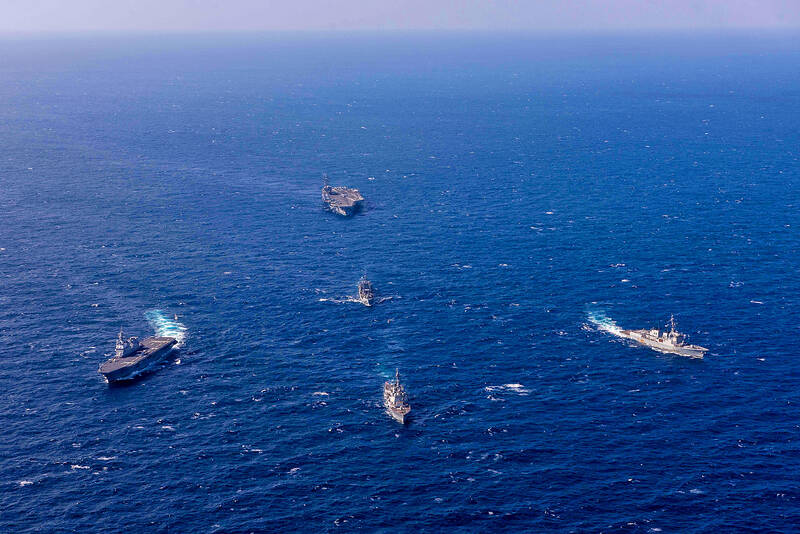The nuclear-powered aircraft carrier USS Ronald Reagan is due to dock at the South Korean port of Busan tomorrow, as Seoul warned of a greater threat from North Korea and held joint maritime drills with the US and Japan.
The carrier, which is expected to remain in Busan until Monday next week, would strengthen the defense posture of South Korea and the US in case of any North Korean provocations, the South Korean Ministry of National Defense said.
The Ronald Reagan last visited South Korea last year for the first time in about four years, joining other military vessels in a show of might intended to send a message to North Korea.

Photo: AFP / South Korean Ministry of National Defense
North Korean state media KCNA yesterday criticized the deployment of US strategic assets, including submarines and bombers, in the Asia-Pacific region, while defending its plans for a spy satellite program as “indispensable.”
Pyongyang has twice failed to place a spy satellite in orbit, in May and August, and has vowed to try again as early as this month.
South Korean Minister of National Defense Shin Won-sik told reporters yesterday that South Korea faces a more severe threat from North Korea, Yonhap news agency reported.
The visit of the carrier comes after the US pledged to enhance the “regular visibility” of its strategic military assets in the Washington Declaration, which South Korean President Yoon Suk-yeol and US President Joe Biden issued during a summit in April.
The South Korean and US navies held joint maritime drills with Japan’s Self-Defense Forces in waters near South Korea’s Jeju Island on Monday and yesterday, the South Korean Navy said.
The drills, which are the first of their kind since 2016, are aimed at deterring and responding to North Korea’s “advancing nuclear and missile threats,” the navy said in a statement.
A meeting was also held on the Ronald Reagan on Sunday, attended by South Korean Fleet Commander Vice Admiral Kim Myung-soo and his US and Japanese counterparts, to discuss countermeasures to Pyongyang’s “underwater threats,” as well as its nuclear and missile programs.

CALL FOR SUPPORT: President William Lai called on lawmakers across party lines to ensure the livelihood of Taiwanese and that national security is protected President William Lai (賴清德) yesterday called for bipartisan support for Taiwan’s investment in self-defense capabilities at the christening and launch of two coast guard vessels at CSBC Corp, Taiwan’s (台灣國際造船) shipyard in Kaohsiung. The Taipei (台北) is the fourth and final ship of the Chiayi-class offshore patrol vessels, and the Siraya (西拉雅) is the Coast Guard Administration’s (CGA) first-ever ocean patrol vessel, the government said. The Taipei is the fourth and final ship of the Chiayi-class offshore patrol vessels with a displacement of about 4,000 tonnes, Lai said. This ship class was ordered as a result of former president Tsai Ing-wen’s (蔡英文) 2018

‘SECRETS’: While saying China would not attack during his presidency, Donald Trump declined to say how Washington would respond if Beijing were to take military action US President Donald Trump said that China would not take military action against Taiwan while he is president, as the Chinese leaders “know the consequences.” Trump made the statement during an interview on CBS’ 60 Minutes program that aired on Sunday, a few days after his meeting with Chinese President Xi Jinping (習近平) in South Korea. “He [Xi] has openly said, and his people have openly said at meetings, ‘we would never do anything while President Trump is president,’ because they know the consequences,” Trump said in the interview. However, he repeatedly declined to say exactly how Washington would respond in

WARFARE: All sectors of society should recognize, unite, and collectively resist and condemn Beijing’s cross-border suppression, MAC Minister Chiu Chui-cheng said The number of Taiwanese detained because of legal affairs by Chinese authorities has tripled this year, as Beijing intensified its intimidation and division of Taiwanese by combining lawfare and cognitive warfare, the Mainland Affairs Council (MAC) said yesterday. MAC Minister Chiu Chui-cheng (邱垂正) made the statement in response to questions by Democratic Progressive Party (DPP) Legislator Puma Shen (沈柏洋) about the government’s response to counter Chinese public opinion warfare, lawfare and psychological warfare. Shen said he is also being investigated by China for promoting “Taiwanese independence.” He was referring to a report published on Tuesday last week by China’s state-run Xinhua news agency,

‘ADDITIONAL CONDITION’: Taiwan will work with like-minded countries to protect its right to participate in next year’s meeting, the foreign ministry said The US will “continue to press China for security arrangements and protocols that safeguard all participants when attending APEC meetings in China,” a US Department of State spokesperson said yesterday, after Beijing suggested that members must adhere to its “one China principle” to participate. “The United States insists on the full and equal participation of all APEC member economies — including Taiwan — consistent with APEC’s guidelines, rules and established practice, as affirmed by China in its offer to host in 2026,” the unnamed spokesperson said in response to media queries about China putting a “one China” principle condition on Taiwan’s